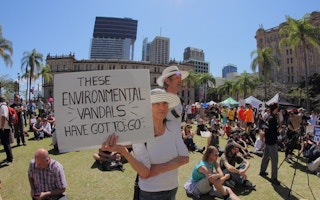Environmental groups urged governments on Wednesday to ban oil companies and other big corporate polluters from any involvement in UN talks on slowing climate change, saying any role was like letting an arsonist work as a fire fighter.
They presented a petition to “kick big polluters out of climate policy” at 190-nation talks in Bonn on curbing global warming, signed by 224,000 people and backed by about 20 groups including Greenpeace USA and Rainforest Action Network.
Bill McKibben, co-founder of green group 350.org that was part of the alliance, said firms that emitted fossil fuels were part of the problem, not the solution.
“Why would you let the professional arsonist join the volunteer fire department?” he asked.
The organisers criticised France, the host of a Paris summit in late 2016 meant to agree a global deal to limit climate change, for letting companies including power utility Electricite de France to be among sponsors of the event.
And they doubted the sincerity of six European oil and gas companies - BG Group, BP, Eni, Royal Dutch Shell, Statoil and France’s Total - which last week urged talks on adopting carbon pricing.
The United Nations, however, is trying to build a broad coalition for action beyond governments - including companies and cities - to limit emissions blamed by a UN panel for causing more droughts, floods and rising sea levels.
Christiana Figueres, head of the UN Climate Change Secretariat, said last week she would continue dialogue with oil and gas companies, for instance, saying they “have an enormous role to play in solving climate change.”
The activists said inviting oil companies to discuss climate change was like asking advice from tobacco companies about health policies.
The environmentalists urged adoption of rules similar to those by the UN’s World Health Organization requiring governments to protect health policies “from commercial and other vested interests of the tobacco industry”.










